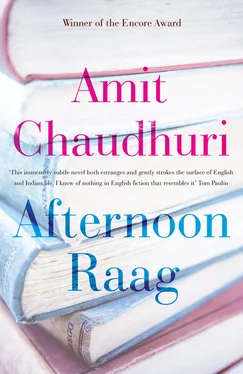And on the roads, one’s neighbours are still Ambassadors, created by the Birlas from odds and ends — the body of a Morris Oxford and a tractor’s engine — outnumbering by far any other car. Ours still has its old Bombay numberplate. On the Ambassador one finds perhaps the only doors that have to be slammed shut, with the maximum of force, without any intention of venting ill-temper, but as a perennial good-humoured habit as one gets in and gets out. Families that own them have had them for twenty years, half the duration of independence, in which time they have been repaired, repainted, sent to garages, reupholstered, and, when the owner is in straitened circumstances, left exposed to the elements. Every few years, the Birlas produce a new model at their factory, Mark III, Mark IV, which exactly replicates the previous one; for the Ambassador has remained faithful to the ideal that was perfected in the secure, organic era of the ‘protected market’, and, in its shape, still retains that philosophical look, that aura of being cut-off from the ‘real’ world: squat, conservative, and spacious.
Cruising downtown in it, one risks the bother of paying a tax to the municipal corporation if one parks it. The tax is collected by men who, sweating from running from car to car in the sun, slip a ticket under the wiper when you are away, and reappear punctually to collect the fee when you are back. Loafers and layabouts as described in the stories of Parashuram and Bibhutibhusan Bandhopadhaya, often charging you without giving you a ticket, they have taken up this job as human parking meters because they haven’t found any other. The trouble they cause is brief, like a mosquito’s sting, and subsides when one drives away.
When I arrived here in the summer, it was from an Oxford that had just gone through its annual dress-rehearsal and theatre of the exams. That was when Shehnaz finally put to use the notes she had made diligently over two years, when, after retching at her basin from nervousness, she would wear her black gown and set out early mornings through narrow cobbled lanes towards the Examination Schools, followed, and led, by other characters similarly dressed, some stepping out of the perfectly ordinary houses along the sides of the road. It was at this time that I began to realize that we were here in Oxford less as individuals than as students, attempting, in a touchingly innocent way, to complete a course and obtain a degree that would not only please us, but our parents, whoever and wherever they were. We were children sent here who, for a period of time till the exams began, behaved and felt like adults. Once the exams were finished the childhood was over, the childhood of which even Shehnaz, Mandira, and I — the affection we felt for each other at our intersection of each other’s life, and the loneliness of being in Oxford — were part.
A student fills the closet and shelves in his room with provisions that seem numerous when they are visible, but actually can be stuffed into one, at the most two suitcases. The student takes the coach to Heathrow; leaves by air; his books are packed in a crate and shipped after him, to travel out of the country upon the old sea-routes. The student’s departure is deceptively fast, while his books’ is slower, more weighted and material, and will reach his country only three months later. A few things are left behind in boxes in the college storeroom, or with friends, as if there were hope of returning in the future.
That summer in Calcutta, I sat and wrote a letter to America, to Shehnaz, and never posted it. Petty details and grievances, and a contradictory feeling of closeness, came to me as I was writing the letter. I took it with me to the General Post Office, a huge building on whose steps, all day, people ascend and descend dramatically, like the diminutive, busy men in the first black and white films. Inside, the Bengali male, dark, not more than five feet and five inches tall, hair carefully parted at the side, can be seen among pots of glue, or queueing up at one of the many windows where an employee sits portioning stamps, or having his letters weighed at a counter, and stamped with an archaic object that looks like a pestle. By evening, however, there is hardly anyone left, and the main room looks large and peaceful in the glow of fluorescent lights; a few employees working overtime sit behind counters, looking as porters on a provincial railway-station do after a train has left, the sense of departure, of a world beyond this one, having disappeared into the ordinariness of another evening and night. I had my letter weighed and stamped, and then decided not to send it. The thin, bespectacled clerk, in whose frail hand the ancient stamp looked so heavy and powerful, said irritably, ‘You mean you want it back?’ He explained to me the rules governing such procedures; he became, temporarily, the voice of the General Post Office; but I only saw before me a middle-aged Bengali whom, I felt vaguely, I already knew from a previous encounter. The more he sensed my frustration, the more he protracted his lecture on a higher logic that transcended personal ideas of reasonableness; and when he handed me the letter, he had me take it out of the envelope, which he tore thoroughly with his own hands.
The two of them have been sleeping on the single bed, he against the wall, and she, lying on her back, next to him. Once, unable to bear her cramped position any more, she slipped off the bed on to the ground, her pillow with her. That was early in the morning. Now it is light. She gets up before him; she rummages among the shelves. She finds a jar of biscuits, and begins to eat them. When she peers through a crack in the curtains, she sees a hedge, and, barely visible above it, pinnacles and rooftops, the dreaming spires. Soon, outside the window, because it is summer, there will be visitors, a goose and a gander, one with pale brown feathers and the other with dark, translucent colours. Like the first tourists to discover a town, they explore the lawn together, though each, doggedly, keeps its distance from the other, maintaining a tangential, somewhat covert, relationship with the other’s self-absorption, like the English couple, Henry and his wife, who are always separated by a few paces during their humdrum walks in Monsieur Hulot’s Holiday. The days belong to these two, with their fussy, academic interests; they do not seem to be in the first flush of love, but in a period of retirement, discovering earthly wonders; and when a window is half opened, they quack acknowledgingly, rather than gratefully, at the thrower of crumbs, but never trouble themselves to look straight at a human face.
She wears her fluffy slippers, quietly opens the door, and goes to the bathroom so as not to disturb him; she solemnly washes her face, brushes her teeth, and combs her hair for almost a minute with her head bent sideways, as if thinking or remembering. Outside, she can hear other students making their first disconnected movements, the tentative noises, like those of a musical instrument being tuned, gradually accumulating and amplifying into a larger significance. She had never thought that she would give so much of herself to that boy still sleeping inside. He makes her angry, now that she loves his college and friends more than her own, and her heart is heavy with the distance she will have to travel. They were friends at first, they took walks, and then he wanted something more — and had she, too, wanted it? — and she found it more and more difficult to say no, to make him unhappy. And when he was unhappy … She makes herself a cup of coffee, and takes it back to the room. She will have to go now, she says, but she will be back in the afternoon to help him pack. I’ll go and start my own packing now, she says. She wears her trousers and shirt, which are lying on the chair in the shadow, and picks up her things.
Читать дальше












